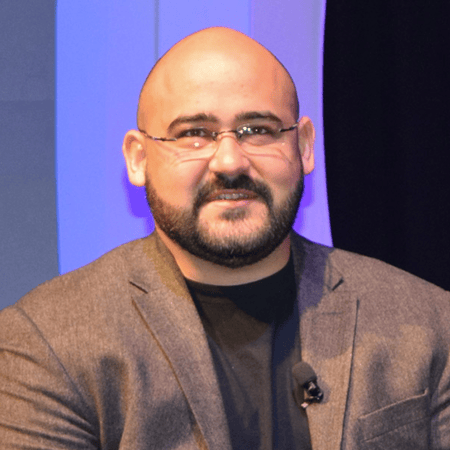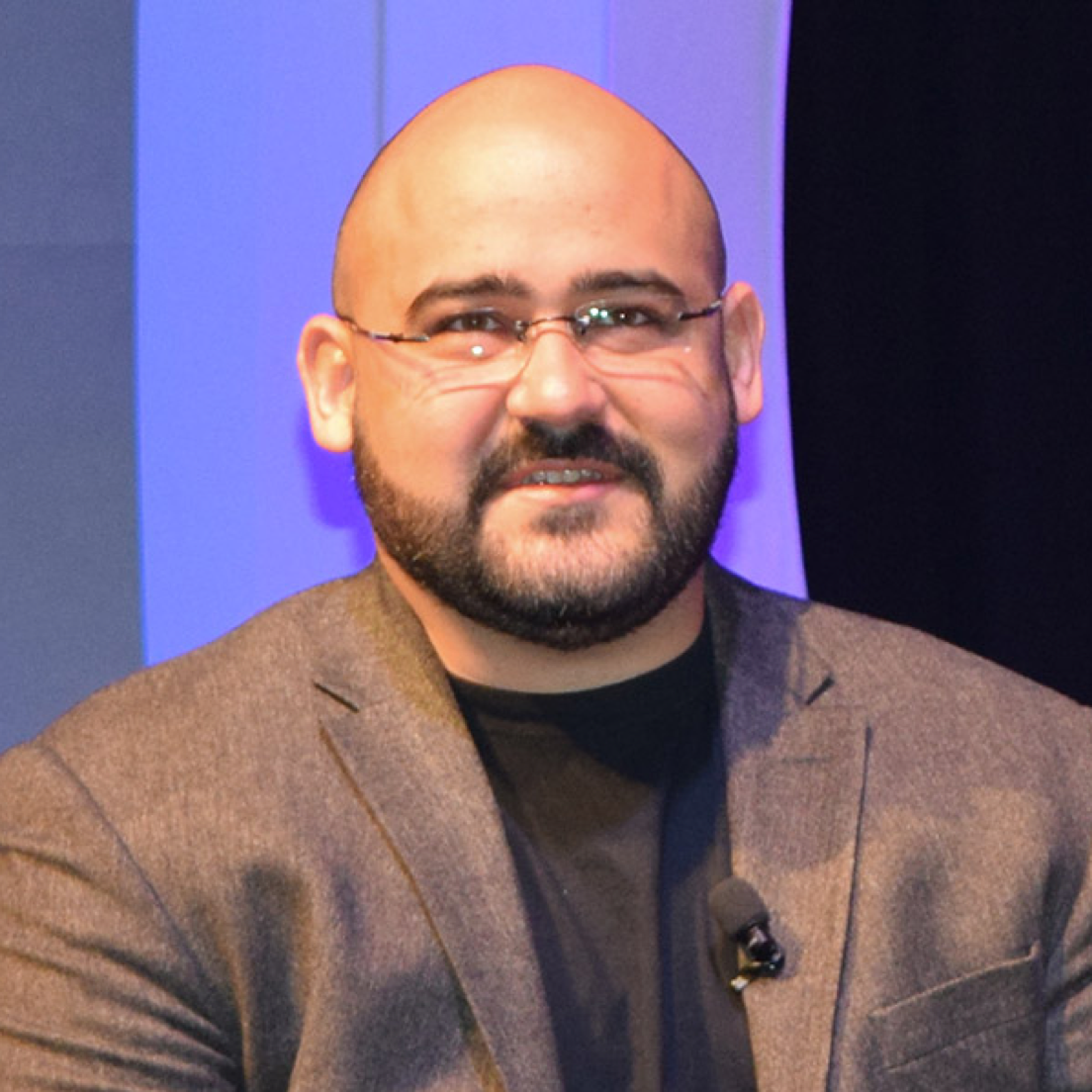About the episode
Sam Mallikarjunan has been at HubSpot for seven years. In that time, he has served as an executive strategist, head of growth for HubSpot Labs, head of eCommerce marketing, and head of experimental marketing.
Sam joined host Matthew Kammerer to talk about the importance of knowing your audience inside and out. Listen to his episode to learn how HubSpot got started with persona development, how personas enable you to take risks, and how to establish trust with the rest of the company.
You can connect with Sam on Twitter.
Don’t have 30 minutes to spare? Jump ahead to key sections outlined below, or keep scrolling for a full transcript of the episode.
- [00:54] All about Sam’s clever campaign to get hired at HubSpot
- [02:42] How do you find new growth opportunities within a company?
- [04:07] What should marketers do first when they start a new role?
- [04:57] How HubSpot managed their persona research (it’s next level, to say the least)
- [10:31] What marketing risks has HubSpot taken that didn’t pay off?
- [12:44] How do you tie ‘mindshare’ content to business goals?
- [20:09] When you join a new team, how do establish respect for the role?
- [22:55] Why does no one trust marketers, and how do we fix it?
- [26:53] What’s your best advice for B2B marketers looking to grow in their careers?
"Ambiguity creates inefficiency. If you don't have the ability to focus, it's unlikely that you'll be very effective."
Episode is brought to you by
-

Matthew Kammerer
Show Host -

Vanessa King
Producer -

Joshua Schnell
Producer
Show Transcript
Matthew Kammerer: Tell me a bit about how you got from your starting point to the HubSpot place, because I know there's a fun story behind that.
Sam Mallikarjunan: So I two CMO jobs, and CMO being a relatively loose term. American Health, which was a health insurance brokerage, I was the CMO but I had no team. It was really just me. And then CheapHumidors.com was my second job, and I was CMO there and we had a small team. And if you feel like making fun of the website, just remember that back then exact match domains were really powerful for SEO. So if people Googled cheap humidors, they would find us.
And after that, when I decided to do some independent consulting and working with local companies, I got more and more into studying some of the HubSpot stuff. But I was grossly unqualified. I had never done anything in tech, had never done real lead generation of any kind, and also don't have a bachelor's degree. So that was a requirement listed on their application.
I knew I wasn't going to get the job. When you know you're going to fail, it sort of tends to open up flexibility for innovation. What I did was I built a website called Hire Me HubSpot with a landing page to register for the free webinar about why you should hire me. Back then webinars were still cool.
And then I got the free credits that you get when you sign up for Google, Facebook, and Linkedin ad accounts. I ran ads targeting the people who work at the company. It's still the most successful campaign I've ever run. Took me 3 hours 26 minutes to get a phone call from their recruiter. The good thing being that I didn't actually have to do the webinar because HubSpot had not yet done a webinar on how to do webinars. So I knew how to create the landing page and capture leads and such, but if they had actually made me do the webinar on why you should hire me I would have been googling elsewhere trying to figure that out.
Matthew: That's an amazing story. So since you joined HubSpot, you've held several different titles. Each are pretty different from different parts of marketing to a few other areas. How did you create those opportunities?
Sam: When I got to HubSpot, we were the largest company I had ever worked at but still relatively small. There was 150 or so people at the company and titles are sort of a fluid thing. We actually had one person who had as their official title just inbound marketing gentlemen. You guys know this, but you end up just doing whatever needs to be done. Everybody does a little bit of everything.
But I have never actually applied for a job internally at HubSpot. There's always just been a need and I've sort of raised my hand and volunteered to do it or been asked by the leadership, "Can I tackle this?"
So I started as what we call our large consultants, which has nothing to do with my weight. Back then we had only small, medium, and large product packages and somebody had the bright idea before I got there to make the differentiator for the large product essentially be unlimited consulting forever, which meant that we had to assemble a team of people to try and find interesting things to do with companies who have been in consulting for years.
It was a lot of fun. We launched what I was pretty sure was the first marketing campaign on Pinterest with one of my customers that was a mortgage company in Michigan. We got to do some interesting stuff like that, but that was on the customer success team. And then after that I moved over to the marketing team.
Matthew: So what are your first steps when you hop into one of those new roles that you've raised your hand for?
Sam: My first step, and I've learned this the hard way, is to make sure that it has clearly defined scope and goals. Ambiguity creates efficiency. It does create opportunity, but if you don't have the ability to focus, it's unlikely you're going to be very effective.
There's the old phrase he who chases two rabbits catches neither, so figuring out what it is specifically that they want me to focus on, figuring out some way to measure that—even if it's not a perfect measurement, something that I can gauge my success against—and then making sure that I understand that. The rest of it, the how and everything else, I have confidence that I can figure out. But if you don't know the why and the what, you're setting yourself up for failure.
Matthew: Speaking about HubSpot Labs a little bit, you once described HubSpot Labs' mandate as finding out how someone else could beat HubSpot and how to overcome that. How'd you do the research to uncover those opportunities?
Sam: So the research is in really understanding your customers and really understanding the market. Understanding the customers is the hard thing to do. We spent a lot of time thinking about the Jobs to be Done framework that Clay Christensen and Max Wessel talk about which is you know, Henry Ford has the most famous quote on this, where he said, "If I had asked my customers what they wanted they would have said a faster horse."
Obviously, he did not found the Ford family horse-breeding corporation. He founded the Ford Motor Company because the Job to be Done was mobility. Get from point A to point B quickly, safely, and cost-effectively.
That's easy to say when I have pre-written anecdotes that I've used on 100 other interviews, but understanding that for a net new product, a new customer, a new offering takes a lot of time. When Google invested in us, they really beat into us the importance of living your customer's life and physically watching them as they go about their day to try and understand what the job is that they're actually solving for and then understanding the world they live in.
So one of the concerns that HubSpot had as a strategy was we had primarily a marketing suite of tools a few years back. And if you look at the dynamics between leaders and marketing organizations such as CMOs and VP of Marketing and those in sales, there's already inherent conflict between marketing and sales. Just how the organizations are designed, the marketing organization doesn't like getting into conflict with sales generally.
So when the VP of sales or the sales leaders say, "Listen, we're already using this particular piece of software and we want you to use this marketing software because it integrates really well with what we're doing," the marketing leader tends to be inclined to agree. So we understood that piece of the life, and we knew that cross-selling from the sales organization into marketing was going to be a threat to us.
And so we thought, how could we approach that if we were going to launch a startup that would get really good at selling into a sales organization and then using that to sell into a marketing organization. What would that look like when we further drill down and understood how sales organizations make their purchasing decisions? Usually the sales software companies sell at the VP level. You sell to the VP of sales some software, and they tried desperately to get everybody on the sales team to actually use that software and use it properly.
So we instead started with a different thesis, which is sell to the sales reps and create a status where the VP of sales wants to buy a subscription for everybody either because it works for the individual sales reps or because there's a layer of functionality that gives them visibility and reporting, etc.
So, a threat to our core marketing software offerings back in the day would have been somebody selling into the sales rep level and using that to get up to the sales leader level and then using that to convince the marketing leaders in a company that they should buy the same integrated software by the same company.
Instead of letting that happen, we just did it to ourselves. And by extension did it to everyone else when we launched our free suite of sales tools, which were originally designed to be used by individual sales reps, now individual teams, and then eventually sales leaders in sales organizations so that you sort of can attack any given company from both angles. You can sell into the marketing organization and then have that marketing person try and convince the sales team to use the integrated tool, or you can sell from the bottom up in a sales organization over.
So that was sort of a threat that we identified just based on spending a lot of time not only understanding features that customers want but understanding the universe they live in, various factors in their decision making, acknowledging that it's not always about features. Sometimes it's about the way in which that relationship is developed inside the customer's company.
Matthew: That makes a lot of sense. I remember that really tool being marketed as a inbox plugin getting better insight into the emails that are happening, right?
Sam: Yeah, so it was called Signals back in the day. It wasn't even branded as HubSpot Sales, which is what it's called now. That was a team within Labs led by one of our executives now who was trying to just answer the hypothesis. Can we create a free tool that lots of sales reps want to use inside of a company and then we just get very broad penetration inside individual sales organizations? And so once we validated that yes, sales reps really love free tools that help them do their jobs better. Then it was okay, now how do we build the layer of both creating a monetized tool on the sales side and then making this beautiful value-add that makes using the marketing software easier as well.
We've sort of always loved the Apple philosophy. When the iPhone first came out, it had a terrible camera. The microphone wasn't the best in the world. It wasn't the best at anything, but it's the fact that those things were all in one package that actually gave them more value than having the best individual camera or something like that.
And so we took that same philosophy when we were approaching how we look at what our customers want. It doesn't necessarily have to have be the best camera on the market. But the fact that it can talk to other things makes a certain segment of the population want to buy it over better cameras. What was the last time you bought a disposable point and shoot camera or something instead of just using your cell phone?
Matthew: Yeah, my father-in-law brought one when we went to Costa Rica. We had just bought him an iPhone, he didn't know how to use it yet. So absolutely I understand. So you clearly took a few risks that paid off. Did you take any risks doing that research process that didn't pay off?
Sam: Oh, we could go on and on about the number of failures both in experimental marketing, which was testing new buyer personas, as well as testing new marketing tactics, as well as Labs, which was more product-oriented.
So for example personas, one of the things we tested was can we sell to e-commerce companies? Turns out yes, we can. Can we sell the agencies? Yes, we can. But there was also can we sell the franchises? Turns out no, because if the home office buys a piece of software that none of the franchises use, they're eventually going to cancel it and it's just really hard to get those people on board if they didn't make the decision themselves.
And then we got other stories like one of the biggest problems in our industry is the professional jobs pipeline. There's just not a ton of people who have a deep experience in inbound that companies can hire. And so for a long time, I was obsessed with building a jobs board on Inbound.org, which is another Labs project that we made for other self-disruption reasons. We couldn't make it work because we weren't a jobs company. We didn't have that competence. We didn't have the mechanism. We didn't have the focus or the economics to do any of that. Indeed and everybody else is just always going to be better at that.
So yeah, we've got tons of those stories but the key to that is to fail quickly. I know this is sort of a cliche in the startup world, fail forward fast, but how fast you can either prove or disprove your hypothesis is how fast you can run through cycles of learning.
It's one of the reasons that selling into enterprise companies tends to have much longer innovation cycles because the speed at which you get feedback from the market is always going to be slower. Whereas if you're selling to consumers you get feedback really quickly. If you're selling to small and medium-sized businesses, you're going to get feedback really quickly. Facebook gets it, you know, 100 times a day. For example, the faster you have that feedback loop, the better decisions you can make, the more quickly you can innovate, and the more things you can try.
Matthew: Moving towards the publication that you helped start, ThinkGrowth.org. It's a medium publication that discusses business strategy and thinking with less of a focus on the tactics and tips. But how do you tie that type of content back to business goals? How do you measure mindshare for example?
Sam: My least favorite phrase is thought leadership, which is ironic because we somewhat self-deprecatingly call it the thought leadership team at HubSpot that does some of that stuff. But the biggest impediment to growth that we have is not somebody selling a cheaper software or software with more features or any of that. The biggest impediment to growth is that the majority of companies, to be blunt, are still pretty bad at sales and marketing. Or, at least they do sales and marketing within the context and strategic perspective of the way things were done 10 or 15 or 20 years ago.
We had to focus on the rising tide raises all boats problem. If you're familiar with Roger's market segments, that nice beautiful bell curve where on the far left you've got innovators and then on the far right you've got laggards and the middle you've got the majority of the market. That big jump, that big chasm from your early adopters to the majority of the market is something that's really hard to overcome unless you do really significant market education. That was part of our philosophy with ThinkGrowth.org and reaching into the executive-level content.
It was not necessarily, how do we drive more sales for HubSpot because HubSpot has a beautiful customer acquisition and retention engine already built for what it's doing. But thinking further down the road as we move up that curve into trying to get the majority of companies in the world using software like this and methodologies like this, even if it's not ours, that was a problem that needs something like ThinkGrowth.org. It's a publication run by HubSpot, but we never talk about HubSpot, and we have contributors who don't work at HubSpot. Some of whom are nominally competitive to HubSpot. The biggest issue being, how do we advance the thinking in the market to be more aligned with what we think people should be doing?
You know to be honest, having that sort of program is a luxury created by our first mover advantage. Because we were early-ish and in the marketing technology space, we have really great economics of the business. Our customer lifetime value is really great. Our ratio of acquisition to lifetime value is really great. And so we can afford to invest in some of these longer vision, what the McKinsey folks would call sort of third horizon types of projects.
Matthew: Was there any pushback internally that you're creating an opportunity for your competition by running something so disconnected from the brand?
Sam: We're not overly concerned about the competition co-opting it or not having brand identity. Again, we have exceptionally good brand identity. People in the space generally know us, they know about us, and that's getting bigger and better every day. You know the rising tide raises all boats. You're right: it's going to raise everybody else's boat as well. But if we have a better boat that moves faster, that's better at the race, that does everything, we're still going to win. But in order for us to win on a large scale and not just be a small company that did one thing that was kind of interesting, we have to create that opportunity for everyone and to be honest, other competitors roll out cool things and we all learn from the market because we're all creating this market as we go.
If somebody's going to do it, it's more important that we do it because first-mover advantage, especially in networks and market networks, is so important. It's far more important that we do it first or we at least do it okay then that we deny any competitors access to it or understanding of it.
Matthew: So, how long have you been with HubSpot?
Sam: I've been at HubSpot just about seven years. Started in 2011.
Matthew: So really close to as long as I've been at BSA. Feels like we've been here forever. We have to retire after this. I think when you create your own career path, you've had a very similar route that I have where you sort of raise your hands to opportunities and get to dabble in a lot of roles over time. The question is post HubSpot or even inside of HubSpot, how do you set out to find your next opportunity?
Sam: Yeah, so I often joke that startups work in dog years. So you and I have both been at our companies for about forty nine years now. It is a long time. The turnover rate and tenure of startups tends to be short. Part of that is because people are right for companies at different points in the company's life cycle and vice versa.
So, the sorts of people that helped HubSpot get its first 10,000 customers are not really the people who are going to be good, nor enjoy, helping us get our next 90,000 customers to get to 100,000 customers sort of thing. Honestly, when I first started at HubSpot and I started seeing some of the old guard leave, that caused me a lot of angst because I'm like, what do they know that I don't? Why are they leaving?
But they left to go back to some other company that was in the lifecycle they're really good at. And the reason I'm still at HubSpot to be blunt is because they've been really good at creating those opportunities inside the company so I can still do the types of work that I love in the environment that I love but sort of within the universe of a large company that has all those associated resources.
So Labs was particularly cool for that because Labs is like running a bunch of startups, or working with Inbound.org you're trying to get that 15% month-over-month growth or 50% month-over-month growth. That's that high energy, high intensity, big challenges nobody understands stuff that I really love. And if retaining that talent is important to you, and it may not be important to you based on your sort of overall strategy, you have to create those opportunities for those people.
I will say the other retention mechanism that has worked really well, especially on me, is when I get CMO offers and stuff like that, I actually bring them to my boss and I ask him what he thinks. I quit HubSpot once for 87 days, sort of a long story, and I think the disservice that I did to my boss, who is the CMO, was I gave him two weeks notice. That's technically proper etiquette, but that's not nearly enough for him to understand why I'm unhappy and see if there's something he can do to use me in a different way or build a a job that I'm going to like or to solve those problems. It's just not enough time for that.
And so I think the core lesson there is if the first time your manager hears that you're unhappy is when you give two weeks notice you've done yourself a disservice as much as them. I've now become really really snobby because my boss has told me that if I ever want to leave HubSpot, I can tell him and he'll help me find my next job, my CMO job or VP job or whatever, and because of that every time a job opportunity comes in I look at it, and I'm like, I could probably do better. And you know, whether that's true or not is hard to say, but as a retention mechanism, my trust and belief that my leaders can find me a better job than the ones that are coming to me makes it so that I never just sort of drop off and leave.
Matthew: The perfect manager. So when you join a brand new team, how do you work to establish respect for that role?
Sam: So there's a couple stakeholders in respect for the role, right? There's the people who are on your team who are doing work for you. There's the people sort of in your upline, your leadership chain, and then there's everybody else at the company.
The people who are above you are creating a team and putting you in charge of it because it fits into the business model somehow. It fits into the economics of the business. And again, as I said earlier, making sure that you understand that scope and that you have commitments to cause and effect, like I'm gonna do this and this is going to be good for the company, that's really important.
For the people on your team, creating that clarity for them of what you expect, how they fit into it, and then also again building that trust of what I'm going to have you be doing is good for the company and it's also going to be good for you. You're going to enjoy it, you're going to find it fulfilling, and it's also going to advance your career.
So investing a lot of time in understanding, especially in our industry where competition for talent is pretty stiff, understanding why they took this job, what their expectations are, etc. Because there are some people who have no expectations other than doing a job that they really really love, this exact thing for a really long time. And that's okay, but you have to understand them and manage them differently than somebody who sort of has their eye on this role being a stepping stone to something else.
And then there's also the stakeholder of everybody else in the company that you have to work with, that your team either influences or needs things from. And the key there to building trust is figuring out what they want and finding out a way to make them winning, you winning. When I sit down with all the teams that sort of sit in the universe that a new team I'm on sits in, figuring out what their goals are and then spending a lot of time thinking about how me doing work for them or them doing work that's going to benefit me helps them hit their goals because even in a company where like, you solve for enterprise value, solve for the customer, or core values, everybody believes that. They still have their own priorities and the odds, especially at startup, that they're going to have a bunch of spare bandwidth that they can throw your way to help you are going to be pretty limited as opposed to if you can make it so that you winning is also them winning.
Then they're going to be super stoked. They're going to be excited and you're going to get the help that you need. So you sort of have to build trust in all three of those dimensions if you want to create a team that's actually going to be effective long-term.
Matthew: In a survey two years ago, HubSpot discovered that only three percent of people trust marketers and sales people. What are we doing wrong?
Sam: So some of our surveys are worse, depending on what region you drill into. In the North American region in 2016, and I want you to think back... You know, there's three things. You never talk about politics, religion, and PC versus Mac. I'm going to talk about politics real quick.
We do have politicians and lobbyists on there. We actually lost to politicians and lobbyists in terms of who people trust in a North American survey in 2016. A truly impressive feat. And the reason is to be honest, we've been bad. We've spent a century abusing people's attention, abusing people's data, and a lot of sales and marketing professionals are still doing it. And I'm not innocent of this. I'll make this confession because this is a podcast and there's no way for your listeners to punch me through the mic. Those really annoying people in malls who harass you trying to sell you cell phones? I used to train those people, and we had as stereotypical phrases as you can imagine: you got to greet to eat, don't spend your time on walks, wastes of time, etc. And you know, just harassing people as they walk through in the mall hoping that five of them that day will stop and buy from me, which was my quota.
We've been truly, truly obnoxious to the point. Where as far as I know, we're the only legal profession where there's an entire very profitable industry of people whose sole job is to stop us from doing our jobs. You all know this very well. So for example ad blockers came around because marketers got really obnoxious with annoying people, destroying people's user experiences, abusing their data, etc. And there are companies that make money off of that. TiVo, you know, DVR. Some marketers somewhere spend a bunch of time on that commercial: the placement, the budgeting, analytics, and everything else, and there are people who sell services and sell technology whose job is to stop us from doing that.
So we've been so obnoxious that people are actually willing to pay money to stop us from doing our jobs. That in itself is an enormous violation of trust. You think of all the other people where there's an industry to stop them from doing their jobs, generally criminals and things like that. We don't trust criminals, and sales and marketing professionals have fallen into the same sort of sphere of trust that those other people have fallen into and it's because of the way we've conducted our profession for the last at least 50 years, if not since its inception.
Matthew: Are we getting better?
Sam: We are. Every year, we do that survey. We're sort of slowly climbing up. In 2016, sales got rounded up to 1%, or maybe it was 2015, and marketing got rounded down to 0%. I think now we're in the 3 to 5% range. We finally beat out politicians and lobbyists. Yay for setting the bar low.
And we are getting better. And I think a lot of that is just that we now are living in a paradigm where doing good marketing is actually good business economics. So inbound, make marketing people love, the tagline that HubSpot had. That's that sounds well and good, but businesses aren't going to do it unless it makes economic sense.
I have a lot of criticisms of Google, but one of the things that they got really good at doing was making it so that spamming Google or abusing customers or tricking customers or whatever was not very cost effective. Same thing with email marketing with spam filters and stuff.
It's actually a lot more profitable to invest in creating marketing experiences that people legitimately enjoy. It's more costly but it's far more profitable than investing your time in abusing their attention and abusing their data and abusing their user experience. So, I think that incentive has really sort of begun to drive the market so that if your business is built around buying a list and spamming it or cold calling or any of those other things, you're not going to survive. Those of us that are really invested in building good marketing experiences are going to win the customer acquisition battle, and we're going to build big companies.
Matthew: What's the best piece of advice you have for B2B marketers looking to grow in their careers?
Sam: In general, my best piece of advice is to acknowledge that all of the decisions that govern your job were made at some point because somebody had to make a decision. It may have been for a good reason at the time or may have been for no reason.
When we finally hired an email marketer, somebody to just do email at HubSpot, they were using the one column template format and I asked them, "What else have you tested?" And they assumed that we were using the one column template format because we spent a bunch of time testing and decided that it was best at some point in the past. That is not at all true. What is true is that we had a bunch of other things to work on, and the one column format was the first option in the software when we loaded it. And so we chose that.
All of those decisions were made by somebody and you should continually understand your role in the business and challenge those, up to and including what the scope of your role is. So marketers tend to sort of want to stay in their sphere, traffic and leads and analytics. Reaching out to the sales organization, finding out ways that you can do sales enablement to improve their close rate, and reaching out to the customer team finding out ways that you can improve the upsell, cross-sell, resell, growing from your customer base, creating and leveraging evangelists.
Those are not parts of the businesses where in most organizations marketing has a specifically delineated area of responsibility. But if you want to grow your career, get good at that. Get good at sales enablement, get good at helping your account management or even just your technical support team, helping them become a revenue center by leveraging evangelists or by increasing that upsell cross-sell. If you can do that, not only does it give you really good cross-functional experience as a professional, but it also makes you quite literally of incalculable value to your company. That's how you advance your career, and that's how you transform the way that marketing is done in your company.
Matthew: Thank you so much for your time today, Sam. Where can folks find you online?
Sam: Thank you, this is a great conversation. You can find me online if you Google anything even close to my name, Mallikarjunan. You'll find my website , my Twitter, my LinkedIn, and also where I publish most of my research is ThinkGrowth.org. You can find my articles there.








